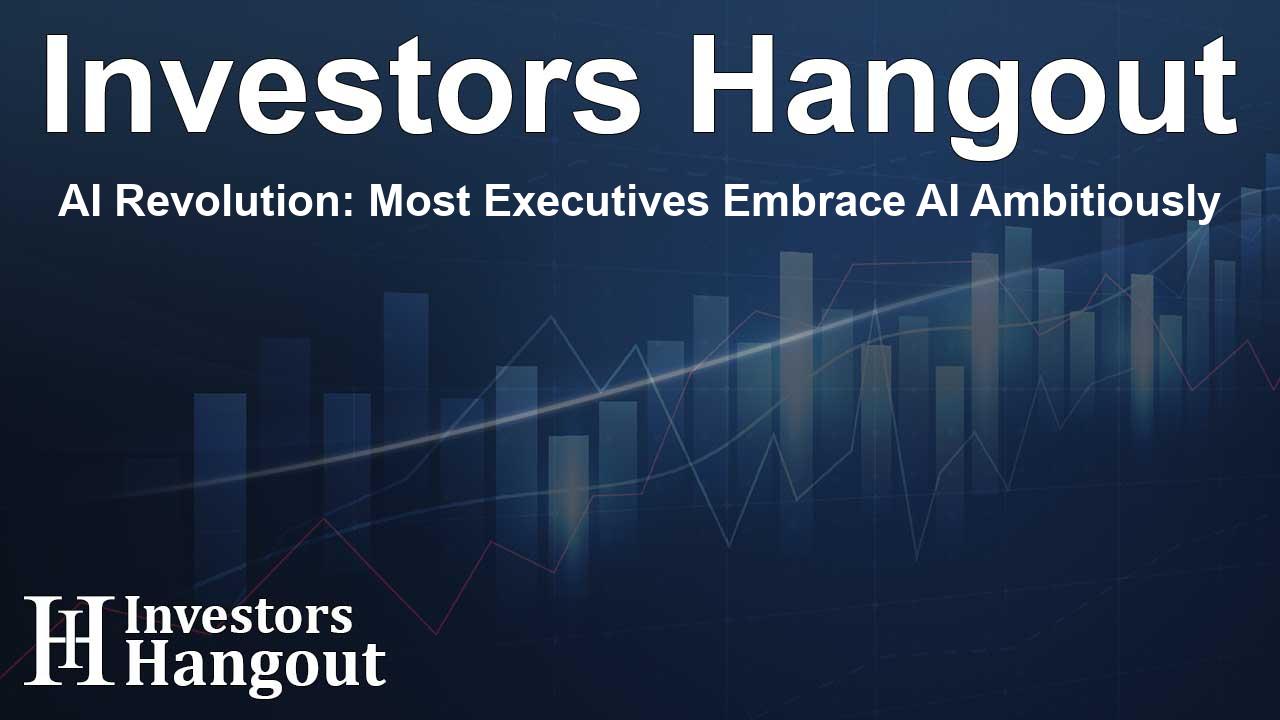AI Revolution: Most Executives Embrace AI Ambitiously

AI Adoption Sees Unprecedented Growth Among Executives
New research reveals that a remarkable 91% of global executives are embracing artificial intelligence (AI) as a core component of their operations. This trend indicates a significant shift in how companies approach work, with AI becoming vital for enhancing productivity and innovation.
The Impact of AI on Business Strategies
As detailed in a recent report, AI is no longer an experimental technology but has firmly established itself as a strategic pillar for organizations. Many leaders believe that AI not only augments productivity but also fosters a competitive edge in today's fast-paced business environment. Executives highlight that their reliance on AI is growing, with 74% acknowledging it as critical for their success. Furthermore, only a fraction—1%—of those surveyed reported not using AI in their operations.
Employee Perspectives on AI
According to the findings, both employees and leaders increasingly depend on AI for everyday tasks. Notably, 74% of executives leverage AI for over 25% of their work, a figure that underscores AI's integration into daily business functions. Interestingly, two-thirds (67%) of executives would prefer utilizing AI to enhance productivity, even if it leads to a diminished workforce.
Decision-Making Considerations
Despite the enthusiasm for adopting AI, many executives express caution regarding its use in high-stakes decision-making scenarios. More than half of the surveyed leaders (51%) indicate they wouldn't trust AI with financial investments or budgetary choices. This hesitance stems from concerns regarding data quality and trustworthiness in AI outputs, highlighting the cautious approach many companies are taking towards AI deployment.
Transformations in Human Resources with AI
Artificial intelligence is reshaping HR operations dramatically. Many HR leaders perceive AI as a crucial asset in automating complex compliance requirements and enhancing overall productivity within HR functions. The report indicates that 82% of HR professionals believe AI is essential for their organization's success, emphasizing its role in enhancing employee experiences and organizational performance.
AI as a Tool for Compliance and Enhancement
Organizations are increasingly using AI to streamline compliance management, communication, and employee training. AI also assists in refining compensation strategies and overall collaboration within teams, effectively addressing intricate HR challenges. This shift signifies a broader acceptance of AI within HR departments as they aim to empower employees while meeting business performance objectives.
Trust and Reliability in AI
The report reveals that while executives embrace AI, there is still a prevalent need for trust and reliability in its application. Organizations are acutely aware of the complexities involved in global HR compliance, where laws and regulations frequently change. Consequently, many executives prefer ensuring human oversight in AI applications to maintain reliability and accountability.
Enhancements through AI Innovations
A standout innovation is G-P's Global HR Agent, G-P Gia™, which aims to provide reliable and expertly vetted guidance for HR leaders throughout the employee lifecycle. This solution is designed to automate processes, from generating compliance documents to providing best practice insights. Such innovations are pivotal in updating HR practices and reducing operational burdens.
Conclusion: The Future of AI in Business
As AI continues to evolve, its integration into business processes appears set to expand, heralding a new era of AI-driven productivity. Companies recognizing the value of AI will likely lead the charge in transforming workplace dynamics, leveraging technology to enhance employee effectiveness and drive success in the digital landscape. The important aspect moving forward will be balancing AI's capabilities with the necessary oversight to foster responsible usage.
Frequently Asked Questions
What percentage of executives are currently using AI?
According to research, 91% of global executives are actively adopting AI technologies in their operations.
What is the significance of AI in the workplace?
AI is critical for enhancing productivity, driving innovation, and maintaining competitiveness in today's business landscape.
How are HR departments leveraging AI?
HR departments are using AI to automate compliance processes, enhance communication, and improve training strategies, signifying a shift towards AI-driven productivity.
Are executives hesitant to rely completely on AI?
Yes, many executives remain cautious, particularly regarding high-stakes decisions, due to concerns about data quality and trust in AI outputs.
What innovations are available for HR professionals?
The G-P Gia™ is an AI-driven solution designed to provide HR leaders with expert guidance and compliance support throughout the employee lifecycle, significantly enhancing efficiencies.
About The Author
Contact Hannah Lewis privately here. Or send an email with ATTN: Hannah Lewis as the subject to contact@investorshangout.com.
About Investors Hangout
Investors Hangout is a leading online stock forum for financial discussion and learning, offering a wide range of free tools and resources. It draws in traders of all levels, who exchange market knowledge, investigate trading tactics, and keep an eye on industry developments in real time. Featuring financial articles, stock message boards, quotes, charts, company profiles, and live news updates. Through cooperative learning and a wealth of informational resources, it helps users from novices creating their first portfolios to experts honing their techniques. Join Investors Hangout today: https://investorshangout.com/
The content of this article is based on factual, publicly available information and does not represent legal, financial, or investment advice. Investors Hangout does not offer financial advice, and the author is not a licensed financial advisor. Consult a qualified advisor before making any financial or investment decisions based on this article. This article should not be considered advice to purchase, sell, or hold any securities or other investments. If any of the material provided here is inaccurate, please contact us for corrections.
